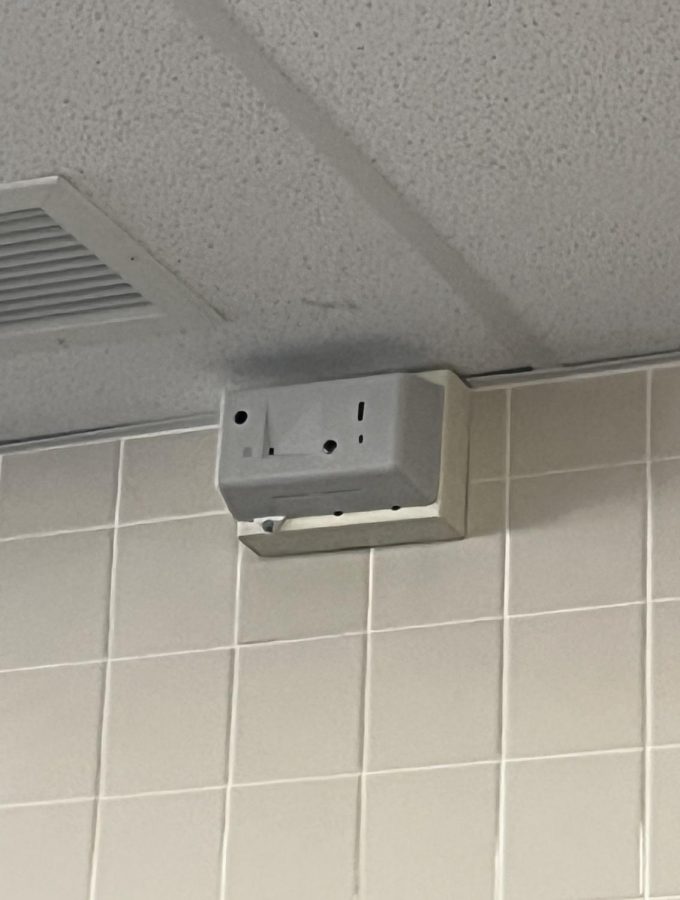When vape detectors were installed in the bathrooms of BHS over the summer, administrators had high hopes to deter students from vaping in school. But are the detectors the most efficient solution to tackle this problem?
Vaping has become a prominent issue among teens in the U.S. over the last couple of years. According to the CDC in 2021, among youth who currently vape, 43.6% of high school students reported doing it in over 20 of the past 30 days. This rising problem has caused many high schools to take action in order to put a stop to this epidemic, including Bernards High School.
The procedure at BHS is that if a student is vaping in one of the bathrooms, the detectors will go off and directly notify three administrators: Dr. Neigel, Dr. Corbett, and Mr. Hoppe. Then, one of them will travel to the bathroom where the detector went off, and hopefully catch the student in the act.
While intentions were to help, not hurt students struggling with nicotine addiction, using the vape detectors to catch them isn’t exactly a foolproof solution. Principal Dr. Neigel said, “I don’t know if I’m getting an alert every time it happens.” Though it is confirmed that the detectors work, they may be unreliable as administrators aren’t sure whether they go off every time someone is vaping. If there are numerous students in the bathroom at a time, and only one of them is vaping, staff would not be able to immediately distinguish which student was vaping. They would then, with reasonable suspicion, question, search, and possibly drug test each student. This is not only unfair to the students who weren’t vaping, but also time-consuming for both the students and the administrators.
To add on, each staff member with access to the detectors is a male. This means they cannot enter when they receive an alert from any of the girl’s bathrooms, and they have to ask female staff on hall duty to go in for them. All of these setbacks provide more time for students who are potentially vaping to dispose of any evidence they may have and even exit the bathroom without anyone suspecting anything. While there are cameras in the hallways, it is hard to tell who was or was not vaping without direct evidence or reasonable suspicion.
Furthermore, when a survey regarding the vape detectors was sent out by all BHS English teachers, students appeared to not know much about the detectors, how they work, or vaping in general. An alarming 46.6% of students said that they are not aware of the ingredients in vapes/e-cigarettes. When asked about their opinions on the vape detectors, many students swore that they don’t vape; seeming as if they were afraid of being caught or punished for something they didn’t do. Mia Antunez, class of 2026, revealed she “never really cared about the vape detectors since I don’t vape. But once I heard everyone in the bathroom gets in trouble when the detectors go off, that made me scared to even go in the bathroom.” This misinformation that any student will get in trouble from just being in the bathroom when the detector goes off seems to be a common fear shared by many others. Some students were also concerned that the detectors were a waste of money. Colby Giunta, class of 2025, expressed that “it really doesn’t affect me. I just hope it doesn’t waste school money.”
The detectors were purchased with federal grant money, according to Dr. Neigel, but some students are not aware of this grant. This illustrates that the lack of information provided regarding the vape detectors has caused a lot of fear and confusion among students. Additionally, after being polled, 28.4% of students revealed that they avoid school bathrooms in fear of being in the bathroom while the vape detector goes off, and 70.5% of students feel that the vape detectors are insignificant to them because they do not vape, therefore the detectors do not concern them.
With the opinions of the student body and all the clear setbacks that the detectors come with in mind, it is apparent that while the vape detectors are a respectable effort to help students with vaping problems, other, more efficient methods should be explored as well. Perhaps BHS should have taught students more about vaping and how dangerous it can be before resorting to such drastic actions. By regularly educating students about the dangers of vaping and clearly establishing regulations, there may be a way to prevent vaping without extreme measures such as the vape detectors.














jace laughter • Jan 11, 2024 at 12:25 pm
a teacher here at grissom high school recently asked me if i was vaping in the bathroom keep in mind i did not have a vape on my person however as i am new at this school i did not know that the specific bathroom i was in was named a “hotspot”.I was nervous due to my anxiety which made me shake he then told me i looked suspicious because of me shaking we have detectors at this school but obviously it didn’t go off because i wasn’t vaping